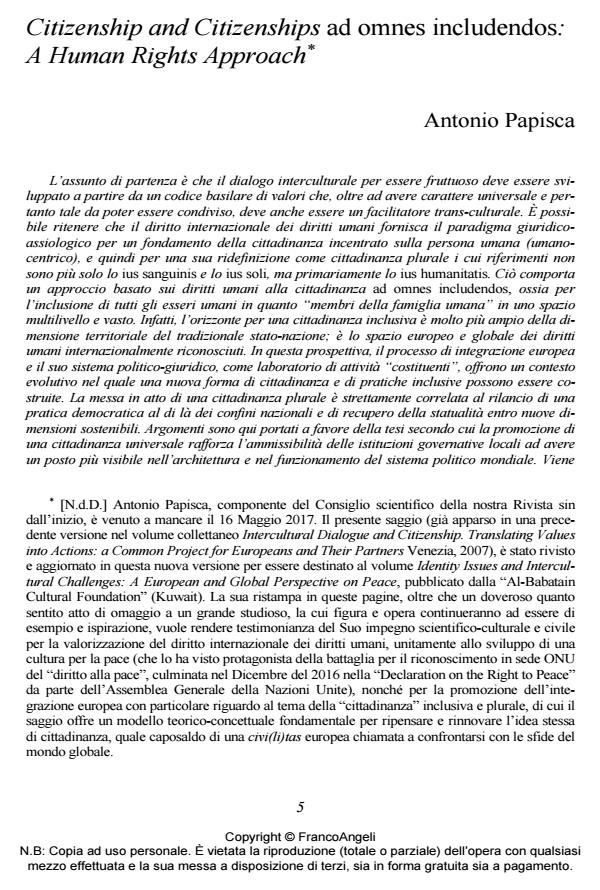Citizenship and Citizenships ad omnes includendos: A Human Rights Approach
Titolo Rivista CITTADINANZA EUROPEA (LA)
Autori/Curatori Antonio Papisca
Anno di pubblicazione 2018 Fascicolo 2017/2
Lingua Inglese Numero pagine 22 P. 5-26 Dimensione file 240 KB
DOI 10.3280/CEU2017-002001
Il DOI è il codice a barre della proprietà intellettuale: per saperne di più
clicca qui
Qui sotto puoi vedere in anteprima la prima pagina di questo articolo.
Se questo articolo ti interessa, lo puoi acquistare (e scaricare in formato pdf) seguendo le facili indicazioni per acquistare il download credit. Acquista Download Credits per scaricare questo Articolo in formato PDF

FrancoAngeli è membro della Publishers International Linking Association, Inc (PILA)associazione indipendente e non profit per facilitare (attraverso i servizi tecnologici implementati da CrossRef.org) l’accesso degli studiosi ai contenuti digitali nelle pubblicazioni professionali e scientifiche
The starting assumption is that intercultural dialogue, to be fruitful, must be developed from a basic code of values, that aside from being universal in character and therefore possible to share, must also be a trans-cultural facilitator. Arguably, the international law of human rights provides the axio-legal paradigm for the human-centric foundation of citizenship, then for its re-definition as plural citizenship whose references are no longer only the ius sanguinis and the ius soli, but primarily the ius humanitatis. It presents the human rights approach to citizenship ad omnes includendos, that is for the inclusion of all human beings, as "members of the human family" in a large and multi-level space. Indeed, the horizon for inclusive citizenship is much broader than the territorial dimension of the traditional nation-state; it is the European and world space of internationally recognised human rights. In this light, the European integration process and its political-legal system, being a laboratory of "constituent" activities, provide an evolutionary context in which new citizenship and inclusion practices can be built. Thus an implementation of plural citizenship is strictly linked to re-launching a democratic practice beyond the national borders, and rescuing statehood providing it with new sustainable dimensions. Arguments are raised in favour of the thesis according to which the promotion of universal citizenship strengthens the eligibility of local government institutions to have a more visible place in the architecture and functioning of the world political system. Emphasis is put on the primacy of the international law of human rights over national and sub-national legal systems. Human rights mainstreaming in local and international public policies is considered one of the greatest challenges for reshaping and developing inclusive infrastructures. In this large context of multiple challenges and opportunities, education is asked to help maturing a new "transcend civic identity".
L’assunto di partenza è che il dialogo interculturale per essere fruttuoso deve essere svi-luppato a partire da un codice basilare di valori che, oltre ad avere carattere universale e pertanto tale da poter essere condiviso, deve anche essere un facilitatore trans-culturale. È possibile ritenere che il diritto internazionale dei diritti umani fornisca il paradigma giuridico-assiologico per un fondamento della cittadinanza incentrato sulla persona umana (umano-centrico), e quindi per una sua ridefinizione come cittadinanza plurale i cui riferimenti non sono più solo lo ius sanguinis e lo ius soli, ma primariamente lo ius humanitatis. Ciò comporta un approccio basato sui diritti umani alla cittadinanza ad omnes includendos, ossia per l’inclusione di tutti gli esseri umani in quanto "membri della famiglia umana" in uno spazio multilivello e vasto. Infatti, l’orizzonte per una cittadinanza inclusiva è molto più ampio della dimensione territoriale del tradizionale stato-nazione; è lo spazio europeo e globale dei diritti umani internazionalmente riconosciuti. In questa prospettiva, il processo di integrazione europea e il suo sistema politico-giuridico, come laboratorio di attività "costituenti", offrono un contesto evolutivo nel quale una nuova forma di cittadinanza e di pratiche inclusive possono essere costruite. La messa in atto di una cittadinanza plurale è strettamente correlata al rilancio di una pratica democratica al di là dei confini nazionali e di recupero della statualità entro nuove dimensioni sostenibili. Argomenti sono qui portati a favore della tesi secondo cui la promozione di una cittadinanza universale rafforza l’ammissibilità delle istituzioni governative locali ad avere un posto più visibile nell’architettura e nel funzionamento del sistema politico mondiale. Viene posto altresì in rilievo il primato del diritto internazionale dei diritti umani sui sistemi giuridici nazionali e locali. L’integrazione dei diritti umani nelle politiche pubbliche locali e internazionali è considerata una delle sfide più importanti per riformare e sviluppare infrastrutture inclusive. In questo ampio contesto di molteplici sfide e opportunità, l’educazione è chiamata a sostenere la maturazione di una nuova "transcend civic identity".
Antonio Papisca, Citizenship and Citizenships ad omnes includendos: A Human Rights Approach in "CITTADINANZA EUROPEA (LA)" 2/2017, pp 5-26, DOI: 10.3280/CEU2017-002001